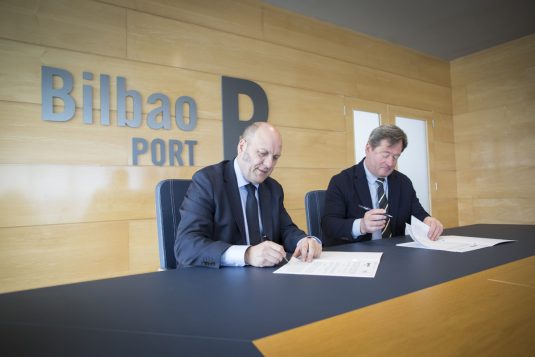The entity undertakes to boost Basque in its attention to the public, its communications directed to the public, and in the Port’s linguistic landscape
Today, the Department of Culture and Linguistic Policy of the Autonomous Basque Government signed an agreement with the Port Authority of Bilbao directed at promoting and regulating the use of Euskera (the Basque Language) in the day-to-day of the entity. This agreement, which will last for four years with the possibility of extending it for a further four, commits the Port Authority to taking the appropriate measures in order to guarantee citizens’ legal rights, by respecting the presence and use of Euskera in its attention to the public, its communications directed to the public, and in the Port’s linguistic landscape. In addition, the entity undertakes to make more use of Euskera “in work relations with its customers and users” as well as in its relations with other administrations.
The agreement was signed today by the Minister for Basque Culture and Linguistic Policy, Bingen Zupiria, and the Chairman of the Port Authority of Bilbao, Asier Atutxa. The Minister began by saying “One of the challenges we have set for this term of office is to boost the use of Euskera in the socio-economic environment. The Port of Bilbao is one of the most important labour environments in the Basque Country, and we express our gratitude for the Port Authority’s commitment to Euskera being very present visually, and especially because the use of the language will gain more ground in relations among workers, with the public and with other administrations”.
The Port Authority Chairman, Asier Atutxa, underlined the fact that “the social responsibility of a public corporation, like the Port Authority of Bilbao, should be primarily based on its activities and relations being immersed in the society it serves, respecting the citizens’ rights, especially the linguistic right to use Euskera in its relations with companies operating in the Basque Country. Thus, the present agreement is framed within the actions of one of the major points of our new strategic plan -the one focussing on the social groups in our environment- distinctly enters this strategy and boosts the use of Euskera, so that beyond guaranteeing legal compliance, we should respond to society’s expectations and become a more transparent, more open and accessible port that watches over our language and culture”. Finally, he informed that in the Port Authority itself a plan for the use of Euskera has commenced with two objectives: to promote its use as the lingua franca among its employees, and to train its employees to encourage its use in their relations with customers and users.
The agreement sets out three fundamental undertakings of the

Port Authority of Bilbao, that specify its intention to takemeasures designed to carry them out:
- To adopt measures in order to guarantee citizens’ linguistic rights. Special emphasis will be placed on attention to the public, on the elements forming signs and the linguistic landscape, as well as on oral and spoken communications directed to the public.
- To adopt measures aimed at encouraging the use of Euskera in work relations with customers and users.
- To adopt measures to encourage the use of Euskera in relations with Public Administrations in the Basque Country. In addition, the agreement establishes that measures will be taken to increase the use of the language in relations with other state Administrations and Public Corporations located in the Autonomous Basque Community.
The Department of Culture and Linguistic Policy through its sub-ministry for Linguistic Policy, undertakes to favour, to the extent possible, the accomplishment of the following commitments, when requested by the Port Authority of Bilbao,:
- Offer advice with regard to managing the regulation of the use of Euskera. Such advice could be both legal and technical.
- Mediate to help and promote the efforts aimed at increasing the use of Euskera in the work relations with other Public Administrations.
- Include the Port Authority of Bilbao, in its promotional campaigns.
For the time being, the agreement does not include any funding, although it does pave the way for dialogue and cooperation on future projects between the two institutions. Today, both parties have emphasised this aspect and are confident that the commitments they have assumed today in this agreement will in the short term become reality.

 Port access
Port access